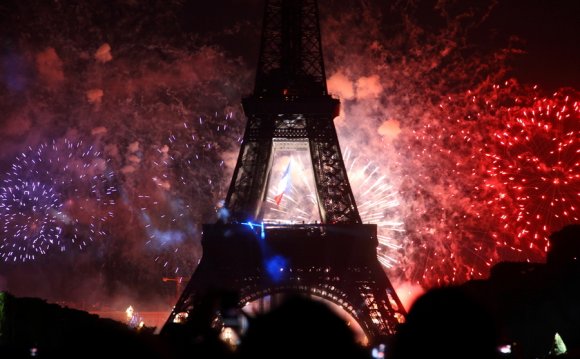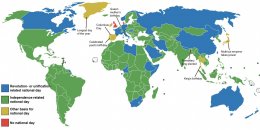
 This map, inspired by a with a similar map, shows the national days of the world's countries. As you can see, the world is mostly divided between countries that celebrate a national independence day and countries that celebrate a national unification or revolution day. The outliers are a tiny minority, and only two countries have no formal national day at all. Here are the four things I found interesting about this once as I mapped it out:
This map, inspired by a with a similar map, shows the national days of the world's countries. As you can see, the world is mostly divided between countries that celebrate a national independence day and countries that celebrate a national unification or revolution day. The outliers are a tiny minority, and only two countries have no formal national day at all. Here are the four things I found interesting about this once as I mapped it out:
1) Yes, most of the world was shaped by colonialism.
It's amazing how much of the map is green, indicating countries that celebrate a national independence day every year. Not all of these marked the end of colonialism (for example, Austria's signifies the withdrawal of foreign militaries after World War II and the declaration of neutrality) but the vast majority do. And even a number of the blue countries, such as Australia and Canada, are actually the product of colonialism.
Think about that: In most of the world, the sense of national identity is shaped by the act of cutting, or in some cases violently throwing off, the chains of colonialism. Maybe that could give us some hint as to the frequent foreign sensitivities and accusations, right or wrong, about Western foreign policy echoing old colonial practices.
2) Most other countries are shaped by relatively recent revolutions.
Consider, for example, the national days of France and Germany: the former marks the French revolution, in 1789, and the latter marks the German reunification in 1990. Russia's national holiday only goes back to 1992, when the Russian Federation was founded. South Africa's is from the first democratic elections, in 1994. Most others are not so recent, but still not so old: Taiwan's, for example, goes back to a 1911 uprising. Saudi Arabia's marks the 1932 unification of the country.
As old as all of these societies are, their senses of national identity are commemorated by remarkably recent events. It's a reminder of turmoil of the last century – a very short span in historical terms – and how deeply its events influence the world today. That too is a reminder as to how new many of the ideas from that century, such as full enfranchisement and national self-determination, really are.
3) Britain and Denmark have no national days.
To paraphrase one of the commenters on the Reddit thread, is certainly is ironic that the British empire that is indirectly responsible for so many of the world's independence days has no real national day of its own. Britain, after all, developed its political institutions pretty gradually, so there was no real "Bastille Day" moment that defines the modern nation. And the empire has been pretty consistently breaking apart over the last half century – Scotland is maybe next – so it's not like there is a national unification to celebrate.
As for Denmark, it has a national liberation day and some people celebrate international worker's day, but neither is a public holiday.
4) The outliers are few but tell you a lot about those countries.
Take, for example, Bhutan, which every celebrates the anniversary of Ugyen Wangchuck's 1907 election as the nation's first hereditary king (yes, you read that correctly), but not its 1949 independence. In Thailand, one of the very few countries outside of Europe that was never formally colonized, the king's birthday is celebrated (don't insult him or you might go to jail, per the lese majeste laws). Japan formally celebrates the anniversary of an ancient mythical emperor, although the holiday is mostly ignored today, due in part to its connections with Japan's ugly imperial history.
Portugal celebrates the 1580 death of celebrated national poet Luis de Camoes, Spain celebrates Columbus Day (yes, the holiday is a little controversial there as well, although not as much as in the U.S.), the Netherlands celebrates the queen's birthday but it still use her mother's birthday for the date and, in Greenland, the celebrate the longest day of the year.
Update: Some readers think that Ireland should also be considered an outlier, as St. Patrick's Day is often considered its primary "national day" and is not really an independence or revolution day. That's true, although the separate "National Day of Commemoration" occurs on the anniversary of the truce ending the Irish war of independence. So the question of how you label Ireland goes back to which holiday you consider its national day. I'll look into this some more and may change it on the map.
RELATED VIDEO












